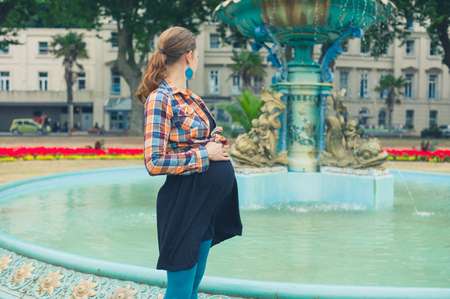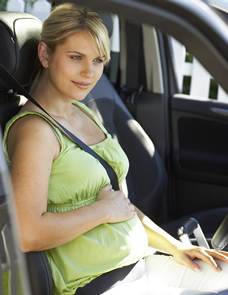Traveling in Pregnancy

In this article, you will find:
On the trip
Sitting in a cramped seat for hours can cause your ankles and feet to swell. If you're traveling by car, stop every hour to stretch your legs, have a snack, or find a bathroom. On a train or airplane, keep your circulation moving with foot and ankle exercises, and get up regularly to walk down the aisle when it's safe to do so. Stay hydrated by drinking lots of water or juice, even if you do need to empty your bladder frequently. A few comforts, such as a cushion to tuck behind your back or a cooling water spritzer, can make a trip more bearable.
There are some activities to forego in pregnancy, such as water skiing or horse riding, where a fall could harm your baby. Scuba diving is particularly dangerous because of the risk of air bubbles forming in the bloodstream. If you have children, ignore pleas to join them on amusement park rides.
If you're used to exercising, there is no reason not to go swimming or walking, just don't overdo it-hiking up hills under a blazing sun could send your temperature soaring, which is a bad thing in pregnancy. In the first trimester especially, extreme heat can affect fetal development. You might also become dehydrated, which later on can increase the risk of premature labor.
Be cautious also about less energetic activities. Hot tubs and saunas are best avoided since the heat could make you feel faint and may be harmful to your baby. An aromatherapy massage sounds like a treat, but some oils may be toxic to the baby, especially in the early months. If you want pampering, look for spas with treatments for pregnant moms.
In pregnancy, your skin becomes more sensitive to the sun, so whatever you're doing be careful to protect against overexposure to the sun.
You've found your passport and put the tickets in your bag. However, when you're pregnant you may also need to take the following items:
- A note from your doctor stating your due date and giving you the all-clear to travel (helpful if you're over 28 weeks).
- Any special medical records regarding your pregnancy or general health.
- A list of numbers for health-care facilities at your destination.
- Remedies for heartburn or other minor pregnancy problems, such as hemorrhoids. You may not be able to buy your usual products abroad.
Experts are investigating a link between prolonged exposure to the sun and damage to the fetus. There is a possibility that ultraviolet rays could cause a deficiency of folic acid-a vitamin that helps prevent defects in the baby's nervous system leading to spina bifida. Nothing is yet proven, but it's not worth taking the risk. Enjoy the sun in moderation but don't bake yourself or use tanning beds before you go on vacation.
Deep vein thrombosis (DVT), the formation of a blood clot in a vein (often in a leg), is sometimes caused by long periods of immobility, such as sitting on a plane (see ... Doctor). Although the risk factor may be slightly increased in pregnant women, because their blood tends to clot more easily, the chance of your developing DVT is still very low. To minimize the risk even further, you could purchase some special support socks, which are designed to improve blood flow in the legs.
In the event of an accident, these appliances are far more likely to prevent injury than cause it-never travel without fastening your seatbelt. For comfort, position the straps above and below your belly rather than across it. Being hit by an inflated airbag will not hurt you or the baby, but to lessen the impact you should position your seat as far back as possible.

The position of your seatbelt may need adjusting to accommodate your belly.